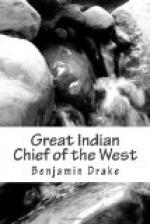“After Black Hawk’s last return from the eastern states, he passed the winter of 1837-8 in the county of Lee, in the south-eastern portion of this territory, on a small stream called Devil-creek. The white settlements extended for forty miles west of him, and the tribe to which he belonged, with the exception of a few old braves, and his family, resided on the frontier. From his tribe he was isolated in position and feeling. His family consisted of a wife, two sons, Nasheaskuk and Samesett, (as they are pronounced here,) a daughter and her husband. They passed their time principally in hunting deer, wild turkies, and the prairie hen, which are abundant in that quarter of the territory. For hunting, Black Hawk is said to have displayed no fondness; but chose to spend his time in improving his place of residence, and exercising his ingenuity with mechanic tools. In the spring of 1838, they removed to the frontier, and settled upon the Des Moines river, about eighty or ninety miles from its mouth, near to a trading post, and in the immediate vicinity of the villages of the other chiefs of the tribe. Here he had a very comfortable bark cabin, which he furnished in imitation of the whites, with chairs, a table, a mirror, and mattrasses. His dress was that of the other chiefs, with the exception of a broad-brimmed black hat, which he usually wore. In the summer he cultivated a few acres of land in corn, melons, and various kinds of vegetables. He was frequently visited by the whites, and I have often heard his hospitality highly commended.
“On the 4th of July last, he was present at Fort Madison, in Lee county, by special invitation, and was the most conspicuous guest of the citizens assembled in commemoration of that day. Among the toasts called forth by the occasion was the following:
“’Our illustrious guest, Black Hawk.—May his declining years be as calm and serene as his previous life has been boisterous and full of warlike incidents. His attachment and present friendship to his white brethren, fully entitle him to a seat at our festive board.’
“So soon as this sentiment was drank, Black Hawk arose and delivered the following speech, which was taken down at the time by two interpreters, and by them furnished for publication.
“’It has pleased the Great Spirit that I am here to-day—I have eaten with my white friends. The earth is our mother—we are now on it—with the Great Spirit above us—It is good. I hope we are all friends here. A few winters ago I was fighting against you—I did wrong, perhaps; but that is past—it is buried—let it be forgotten.
“’Rock river was a beautiful country—I liked my towns, my cornfields, and the home of my people. I fought for it. It is now yours—keep it as we did—it will produce you good crops.
“’I thank the Great Spirit that I am now friendly with my white brethren—we are here together—we have eaten together—we are friends—it is his wish and mine. I thank you for your friendship.




